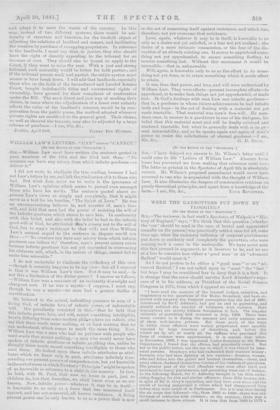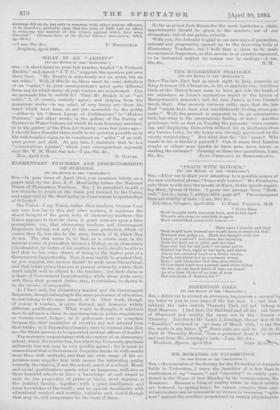WERE THE GARROTTERS PUT DOWN BY FLOGGING?
(To THE EDITOR OF THE " SPECTATOR."] Sin,—The reviewer, in last week's Spectator, of' Walpole's " His- tory of England," says, " We think that this question [whether the cat ' should be used in the case of brutal and. aggravated assaults on the person] was practically settled once for all, some time ago, when the summary infliction of corporal punishment put down BO suddenly and completely the garrotters who we're causing such a scare in the metropolis. We have never seen this fact pressed ill argument, as it deserves to be, and we are at a loss to conceive how either .a good man' or an advanced
Radical' would meet it."
As I do not profess to be either a "good man" or an "ad- vanced Radical," I am not called upon to " meet " the "fact," hat hope I may be considered free to deny that it is a fact. It is strange that the error should survive Lord Aberdare's expo- sure of it in his address, as President of the Social Science
Congress in 1875, from which I append an extract :—
" I have read the answers of the learned Judges, recorders, and magistrates to the questions of the Homo Secretary, and have ob- served with surprise the frequent assumption that the Act of 1863, introduced by Sir C. Addefloy, had put an end to garrotting, and greatly reduced the number of robberies with .violence. Both assumptions ere utterly without foundation in fact. The singular outbreak of garrotting first occurred in July, 1862. There were many victims to it during the summer and early autumn, some of them well-known persons. But those parts of the town in which these offences were mainly perpetrated were speedily watched by large numbers of detectives, and, before the winter set in, all, or nearly all, the ruffians who practised this form of violence were apprehended. It is certain that when, in November, 1862, I was appointed Under-Secretary to the Horne Department, I found that the offence had practically ceased. But not so the public terror, nor the use to which it was turned by inter- ested persons. Shopboys, who had embezzled their masters' money ; footmen, who had been fighting at low easinoes ; drunken women, who had fallen into the gutter and bruised themselves,—these, and many others, declared themselves victims of the violence of garrotters. The greater part of the real offenders were soon after tried, and sentenced to heavy punishments, end garrotting went out of fashion. In the following March, Sir C. Adderley brought in his Bills autho- rising flogging for this and similar offences; these Bills became law, in spite of Sir G. Grey's opposition, and they have ever since had the credit of having suppressed a crime which lied disappeared long before they were heard of in Parliament. Nor is it true that during the six years that followed—viz,, from 1863 to 1869—there was any decrease of robberies with violence; on the contrsry, there was A small increase in these crimes. It is true that from 1869 to 1873 a decrease did sot in, but only in common with other serious offences. It is, therefore, perfeetly clear that the Acts of 18(33 had no effect in reducing the number of the crimes against which they were directed." (Transactions of the Social Science Association, 1875, pp. 33-4.)
Brighton, April 241h.



































 Previous page
Previous page